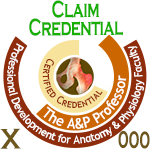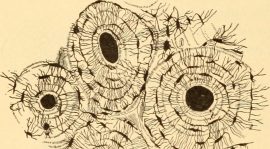Language of Muscles: A Strategy for Learning
TAPP Radio Episode 39
Quick Take
00:51 | Cerebellum Functions
06:28 | Sponsored by HAPS
06:52 | Liver Responds to Food Stimuli
09:06 | Sponsored by AAA
09:26 | Exercise, Diet, Metabolism, & Body Weight
17:29 | Sponsored by HAPI Online Graduate Program
17:58 | Featured: Language of Muscles: A Strategy for Learning
Listen Now!
Want to listen to this episode’s Preview (with additional content)?
If you’ve got a big gut and you start doing sit-ups, you are going to get bigger because you build up the muscle. You’ve got to get rid of that fat! How do you get rid of fat? By changing your diet. (Jack LaLanne)
1 | Cerebellum Functions
5.5 minutes
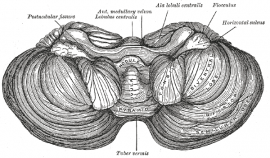 The cerebellum is well known for planning and coordination of motor programs. But there’s more to it!
The cerebellum is well known for planning and coordination of motor programs. But there’s more to it!
- The Cerebellum Is Your “Little Brain”—and It Does Some Pretty Big Things (article from Scientific American) my-ap.us/2UrcmCg
- Making Moves and Memories: Are They Connected? (summary article) my-ap.us/2UsHscJ
- A cortico-cerebellar loop for motor planning (research article) my-ap.us/2UsHtNP
- Functional topography in the human cerebellum: A meta-analysis of neuroimaging studies (research article) my-ap.us/2UB3mKM
- Cerebellar modulation of the reward circuitry and social behavior (research article) my-ap.us/2UB3nyk
- Short latency cerebellar modulation of the basal ganglia (research article) my-ap.us/2UsXJP3
- The cerebellum gets social (commentary in Science) my-ap.us/2UsXKT7
- The Role of the Cerebellum in Cognitive and Affective Processes (online reference module) my-ap.us/2UsCVab
- The Somatic Nervous System (online reference module) my-ap.us/2UwiitO
2 | Sponsored by HAPS
0.5 minute
 The Human Anatomy & Physiology Society (HAPS) is a sponsor of this podcast. Did you know there’s a one-day regional HAPS conference in March? Check it out. You can help appreciate their support by clicking the link below and checking out the many resources and benefits found there.
The Human Anatomy & Physiology Society (HAPS) is a sponsor of this podcast. Did you know there’s a one-day regional HAPS conference in March? Check it out. You can help appreciate their support by clicking the link below and checking out the many resources and benefits found there.
3 | Liver Anticipates Food
We know that digestive organs respond to anticipation of food—as if food really is going to be ingested and swallowed. New research suggests that the sight of a donut (for example) can get our hepatic cells to start revving up for the storage and processing of nutrients during the absorptive state.
- POMC is short for proopiomelanocortin
- The role of proopiomelanocortin (POMC) neurones in feeding behaviour (review article) my-ap.us/2UqukVn
- Just the Sight of Food Gets the Liver Ready for Action (summary article) my-ap.us/2UvyjAi
- Food Perception Primes Hepatic ER Homeostasis via Melanocortin-Dependent Control of mTOR Activation (research article) my-ap.us/2UtU7ML
4 | Sponsored by AAA
0.5 minutes
The searchable transcript for this episode, as well as the captioned audiogram of this episode, are sponsored by The American Association of Anatomists (AAA) at anatomy.org. Their big meeting is in April at the Experimental Biology (EB) meeting in Orlando FL. Check it out!
5 | What Do We Really Know About Exercise, Diet, Metabolism, & Body Weight?
8 minutes
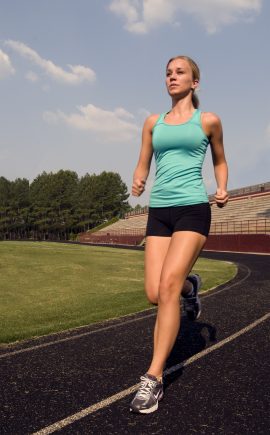 The science of exercise, diet, metabolism, and body weight—and what is healthy and what is not—is far from being worked out. Sometimes, the simplest principles that we believe to be true, aren’t really. A of research seems to conflict, which means we have much more work to do, eh?
The science of exercise, diet, metabolism, and body weight—and what is healthy and what is not—is far from being worked out. Sometimes, the simplest principles that we believe to be true, aren’t really. A of research seems to conflict, which means we have much more work to do, eh?
If you are fan of stories without a satisfying ending and conflicting subplots, follow the [whole grain] bread crumbs here:
- Why doing more exercise won’t help you burn more calories (summary article) my-ap.us/2UvbkFv
- No sweat: The smart guide to exercise (summary article) my-ap.us/2UvLlxw
- Hunter-Gatherer Energetics and Human Obesity (research article) my-ap.us/2UxlGog
- Constrained Total Energy Expenditure and Metabolic Adaptation to Physical Activity in Adult Humans. (research article) my-ap.us/2UuYAi3
- Is there spontaneous energy expenditure compensation in response to intensive exercise in obese youth? (research article) my-ap.us/2UsT53j
- The workout pill: Why exercise is the best medicine (summary article points out exercise benefits other than weight control) my-ap.us/2UtGtcf
- Persistent metabolic adaptation 6 years after “The Biggest Loser” competition (research article) my-ap.us/2UAvTR3
- Do skinny people have faster metabolisms? Not really (summary article) my-ap.us/2Uu0WxR
- Non-exercise activity thermogenesis (NEAT). (descriptive article) my-ap.us/2UvL91w
- Slim people have a genetic advantage when it comes to maintaining their weight (summary article) my-ap.us/2UvPxxc
- Genetic architecture of human thinness compared to severe obesity (research article) my-ap.us/2UpkWS2
- Top 10 Reasons Why The BMI Is Bogus (summary article) my-ap.us/2UAwdzf
- The Health Risk of Obesity—Better Metrics Imperative (perspective article in Science) my-ap.us/2UvLkKe
- Association of Body Mass Index With Lifetime Risk of Cardiovascular Disease and Compression of Morbidity (research article) my-ap.us/2UpNATe
- Is the doughnut diet too good to be true? (umm…) my-ap.us/2UtRyKz
6 | Sponsored by HAPI Online Graduate Program
0.5 minutes
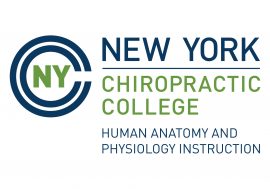 The Master of Science in Human Anatomy & Physiology Instruction—the MS-HAPI—is graduate program for A&P teachers. A combination of science courses (enough to qualify you to teach at the college level) and courses in instructional practice, this program helps you power up your teaching. Kevin Patton is a faculty member in this program. Check it out!
The Master of Science in Human Anatomy & Physiology Instruction—the MS-HAPI—is graduate program for A&P teachers. A combination of science courses (enough to qualify you to teach at the college level) and courses in instructional practice, this program helps you power up your teaching. Kevin Patton is a faculty member in this program. Check it out!
7 | Featured: Language of Muscles: A Strategy for Learning
17 minutes
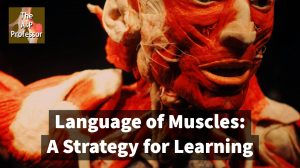
- Muscle Names Have Meaning (Lion Den summary for students, with additional links/video, link to handouts) lionden.com/tips-lab-anatomy-muscle-names.htm
- Download link for handouts
- Translating muscle names (article from The A&P Student blog) my-ap.us/2UveAkd
- Nine Super Strategies for Teaching the Skeleton | Episode 10 (previous episode in which I outline a similar strategy for learning bones)
Need help accessing resources locked behind a paywall?
Check out this advice from Episode 32 to get what you need!
(If no link or player are visible, go to https://youtu.be/JU_l76JGwVw?t=440)
This podcast is sponsored by the
Human Anatomy & Physiology Society

This podcast is sponsored by the
Master of Science in
Human Anatomy & Physiology Instruction
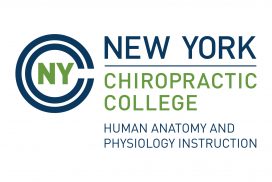
Stay Connected
The easiest way to keep up with new episodes is with the free mobile app:


Or you can listen in your favorite podcast or radio app.
Click here to be notified by blog post when new episodes become available (make sure The A&P Professor option is checked).
Transcript
To read a complete transcript of this episode,
click here.
The searchable transcript for this episode is sponsored by
The American Association of Anatomists.

Call in
Record your question or share an idea and I may use it in a future podcast!
Toll-free:
1·833·LION·DEN
(1·833·546·6336)
Local:
1·636·486·4185
Email:
podcast@theAPprofessor.org
Share

Preview of Episode 40
Host Kevin Patton previews the content of the upcoming full episode, which features a discussion of eponyms in scientific terminology. There’s more… some word dissections, and a recommendation from The A&P Professor Book Club.
Topic
.5 minute
- All about eponyms: the good, the bad, and the ugly
- What are eponyms?
- Why are they going out of style?
Word Dissections
3.5 minutes
- Eponym
- Loop of Henle
- haversian canal
- Clopton Havers
- Toponym
- Lyme disease
Book Club
3 minutes
- The Secret Language of Anatomy 1st Edition
- by Cecilia Brassett, Emily Evans, Isla Fay, forward by Alice Roberts
- amzn.to/2YhNe34
- Check out The A&P Professor Book Club
Last updated: December 30, 2020 at 10:38 am

